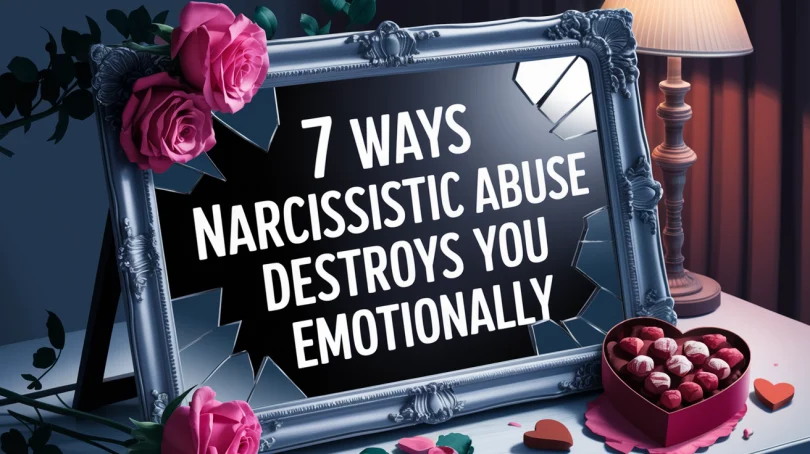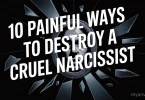We all know that narcissistic abuse can leave you feeling pretty messed up emotionally. It leaves emotional scars that are not always visible, and although you might be able to seem okay on the outside, deep down, you’re not okay. Often, these emotional struggles do ease up over time once you’re no longer under the narcissist’s thumb, but sometimes they last long after the relationship is over.
Before we jump in, let me just say that I’ll be focused on covert narcissism, but this type of emotional damage can also happen in any relationship where you experience emotional abuse, regardless of whether the person meets the full criteria for narcissistic personality disorder.
It’s also important to remember that we’re all human. We can be in a bad mood or not on our best behavior, but covert narcissists have intense, unpredictable, frequent mood swings and drastically shifting attitudes and behaviors, which are often a way to emotionally manipulate and control you.
So, the first thing that you might experience is emotional exhaustion.
1: Emotional Exhaustion
When you first get strapped onto that giant emotional roller coaster ride, it might feel exciting, but eventually, you will get emotional whiplash. What you might see is that one moment they’re in a good mood, having fun, and everything seems fine, and then they flip like a switch.
Now, they’re lashing out at you, not talking to you, or ranting about whoever they think did them wrong. They might spiral into self-pity, crying, needing your help, making you feel responsible to fix whatever problem they’re facing or fabricating.
The point is, they change on a dime, and you never know when to expect the next storm. And once this storm passes which could take hours, days, maybe even weeks they often act like nothing ever happened. They’re talking about some random, unrelated things, posting happy photos on social media, maybe planning a trip, carrying on as usual. This sudden shift can leave you dizzy and disoriented, questioning whether it was all just a dramatic performance to get validation or to manipulate the situation to get what they want.
It’s emotionally draining because you drop everything and pour your energy into trying to support them, only to feel like it was all for nothing as they move on without a second thought, only to repeat the same cycle over and over again. The emotional toll that this takes on you on this roller coaster will leave you drained to no end. And even if you do manage to get out of the relationship, you might find that you can’t get off the ride, and you just keep spiraling deeper and deeper into this state of exhaustion and burnout.
2: Anger and Resentment
When you start to see how you’re being manipulated, controlled, and strung along, it can feel like a massive punch to the gut. You’ll think of all the time, energy, and money that you poured into this relationship and realize that it’s all for nothing. The whole relationship, other than the first few months, you’ve been taken for granted and taken advantage of. Your needs were ignored, your boundaries were crossed, and your emotions, opinions, and concerns were dismissed while theirs always took top priority.
You might find yourself filled with anger at the injustice of it all having given everything only to be devalued and rejected. I could give you tons of examples of how this can happen, but here’s one: Let’s say you’re having a problem at work. You come home wanting to talk about it. Instead of supporting you and helping you find solutions, a narcissist will take it as an opportunity to criticize you.
They might start by giving you a disgusted, dirty look, like, “Why are you bothering me with such a minor problem?” Or worse, they’ll take anyone’s side but yours, telling you what you should have done differently, and how you brought this on yourself, and then they’ll use it against you as evidence of your weakness and incompetence. Yet, anytime they have a problem or a concern, you are expected to drop everything.
And if you dare to question their perspective or offer anything less than unwavering support and validation, you will face the wrath of their icy rejection. This constant suppression of your own needs, thoughts, feelings, and concerns creates resentment that boils under the surface. And your anger might not just be directed at them it could also turn inward. You might start being angry at yourself for putting up with this.
This anger can last long after the relationship is over. It might show up when you think about how you were mistreated or when you hear about how they’re moving on with someone else. And it might just be when you realize that they don’t care one ounce about the emotional chaos and struggle that they’ve caused you. And no matter how much time passes, it can be hard to shake off that bitterness, even though you intellectually know that it’s not good for you to hang on to this anger.
3: Fear and Anxiety
After experiencing narcissistic abuse, you may find that your nervous system is stuck on high alert. You might find that you’re always scanning for threats and bracing yourself for the next storm. The unpredictability of narcissistic abuse trains your brain to be hypersensitive to even the smallest signs of danger, so you’re always on edge, constantly watching for changes in people’s moods and behavior even when you know you’re in a safe environment with people that you know well.
This chronic anxiety can stay with you, making you feel uneasy like you can never really relax. And even if you do get out of the toxic relationship, you might find that you can’t break free from that sense of impending doom that feeling like something bad is about to happen. And you might find yourself spending a lot of time and energy trying to predict and prevent problems that don’t even exist.
This can be overwhelming, making you feel like you’re always nervous on the inside, even when there’s nothing to worry about on the outside.
4: Depression and Despair
Now, this isn’t just a feeling of being down or sad for a few days. This is the kind of dark emotion that settles in deeply, leaving you feeling emotionally numb and disconnected. It’s a feeling of hopelessness like there’s nothing you can say or do to make things better or even to make yourself feel better.
You might find yourself pulling away from friends, family, or not being interested in activities that you used to love. It’s like there’s just no joy in anything or anyone anymore. And you might find that you have no motivation, no energy, which makes even small tasks feel like a huge mountain to climb. So, you might end up at a point where you’re just trying to get through another day and feel like a zombie existing but not truly living.
And unfortunately, even after the relationship ends, their condescending voice often stays with you, keeping you down, and trying to make you believe that you have nothing to live for without them.
5: Guilt, Shame, and a Sense of Obligation
Where covert narcissists truly shine is in their ability to warp your sense of responsibility and self-worth. They have mad skills when it comes to drawing you in emotionally and getting you invested in fixing their problems. So, at first, they make you feel like you’re the best thing that’s ever happened to them the only person in the whole wide world that they’ve ever been able to fully trust. And they will make you feel indispensable.
They give you the grand purpose of being their savior, and soon, you may find yourself making promises to be their end-all, be-all. From this point forward, you will have the impossible task of trying to keep them happy and proving your worth to them. You’ll be serving, supporting, and slaving over them constantly. And at first, they will reward you for these efforts and make you feel really, really good about yourself.
But there is a point where it will all start to switch, and the rug will be pulled out from under you. Maybe you make a mistake, disappoint them in some way we’re all human; we’re not perfect but suddenly, you’ll be accused of not being who you said you were, not keeping your promises, not being as good as so-and-so, and everything that’s going wrong is suddenly your fault.
Their shaming tactics will come in all different forms and from every angle. So, at every turn, you’ll be made to feel inadequate, flawed, and to blame. And it doesn’t matter how hard you try to fix it you will never live it down. Everything you’ve ever said or done wrong will be held against you forevermore. And it doesn’t matter that they’ve said and done things that are way worse to you no, because in their mind, you cause their bad moods and their bad behavior.
Unfortunately, over time, you may start to believe that you deserve their mistreatment, manipulation, and abuse. You might internalize the idea that there’s something wrong with you that you are fully to blame or maybe even that you’re not worthy of love, respect, or basic kindness and care.
Even after the relationship ends, you might still find yourself questioning if you were the problem or if you failed them in some major way. You might think, “If I’d just done more or been better or hadn’t made that mistake, maybe things could have worked out.” And this constant cycle of self-blame and shame can leave you stuck, trying to figure out how you could have met those impossible expectations and standards that, of course, only apply to you.
The obligation to fix things or to prove yourself might linger, making you feel like you still owe them something. And this can go on for a very long time.
6: Lack of Trust
It’s mind-blowing how narcissists can act all honest, caring, and empathetic around everyone else but then turn around and treat you like dirt. It’s like you’re living in a twisted reality where you’re the only one who sees their true colors and yet, you were fooled by them too in the beginning.
Being deceived like this can make it hard for you to trust your ability to judge other people’s character. You might wonder how you could have been so wrong about someone. And then there’s all of the gut-wrenching betrayals after you’ve given up everything for them. It feels like you were just a pawn in their game.
So, this sense of being fooled and taken advantage of having your trust and your love exploited is emotionally devastating. And it can leave you struggling to trust anyone again. You might start to wonder if everyone is just putting on a show, waiting for the right moment to reveal their true manipulative, selfish nature.
And you might be questioning everyone’s motives, constantly suspicious of their intentions, which obviously makes it hard to open up to anyone because you’re worried that they could turn around at any given moment and break your trust and exploit your vulnerabilities to manipulate and control you.
So, this fear can block you from forming healthy, meaningful relationships especially intimate ones, where you need to trust someone with your heart again.
7: Loss of Identity
Narcissists are masters at making everything about them. They demand all of the attention. They demand that you constantly prioritize their needs, their emotions, their thoughts, their concerns, their opinions. And this constant pressure to cater to them slowly erodes your sense of self.
So, they’re always belittling your interests, dismissing your opinions, making you feel guilty for having needs and boundaries. And so, when the relationship continues, you start to suppress those parts of yourself to try to meet their expectations and avoid their criticisms and rejection.
This breaks down your confidence and your sense of self, so you start to feel like you don’t even know who you are anymore or what you want out of life.






